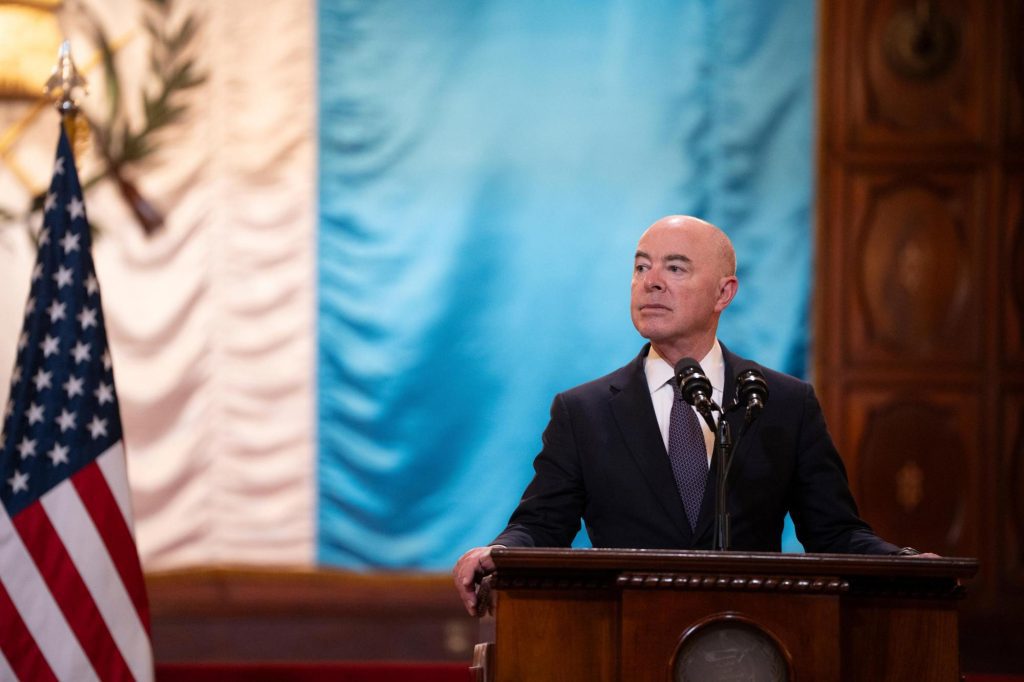By SONIA PÉREZ D. (Associated Press)
In Guatemala City, U.S. Homeland Security Secretary Alejandro Mayorkas stated on Thursday that a Texas law allowing state authorities to arrest and deport migrants who entered the country illegally is unconstitutional.
Mayorkas expressed his strong belief that the Texas law, known as SB4, is unconstitutional as a matter of law during a joint news conference with Guatemala President Bernardo Arévalo in the Guatemalan capital.
The Texas law, passed last year, would enable the state to arrest and deport individuals who enter the U.S. illegally. The U.S. Justice Department has contested the law as a clear violation of federal authority.
A three-judge panel of the 5th U.S. Circuit Court of Appeals heard arguments regarding the Texas law on Wednesday, but did not make a ruling. For now, the law is on hold.
In a later interview with The Associated Press on Thursday, Mayorkas also expressed concerns about the potential chaos and negative impact on border migration if SB4 were to continue.
Mayorkas described the U.S.-led regional immigration strategy as aiming to establish legal and safe pathways for individuals to seek safety from persecution, while returning those who do not use those legal pathways to their home countries.
As part of these safe pathways, the U.S. is working to simplify the process for those seeking U.S. asylum in the region through designated safe mobility offices, allowing migrants to commence the process from their current location rather than making the hazardous and costly journey to the U.S. border.
Mayorkas' delegation has requested that Guatemala allow the safe mobility office to handle requests from migrants of other nationalities, although Guatemala's office is currently limited to Guatemalans seeking U.S. protection, according to an unnamed Guatemalan official.
When asked during the joint news conference if the U.S. government had requested Guatemala to sign a safe third country agreement, Mayorkas did not provide a direct answer. This type of agreement would mandate that migrants from other countries passing through Guatemala seek protection from the Guatemalan government instead of at the U.S. border.
During the interview with the AP, Mayorkas mentioned that Guatemala could be a secure destination for certain migrants, but deferred to the judgment of Arévalo’s administration on this matter.
The U.S. has been working to enhance cooperation with countries along the migrant route, such as Guatemala, Mexico, Costa Rica, Panama, Colombia, and Ecuador. Mayorkas recognized that building cooperation has been tough in Nicaragua and Venezuela, where the U.S. has strained relations with the governments.
Arévalo stated the discussions in a similar way. He said, “We believe that the immigration issue is a regional problem and requires solutions that involve the cooperative efforts of different countries.”
Mayorkas also expressed support for the Guatemalan leader, whose election victory last year was contested and whose party still faces legal action from Guatemala’s attorney general.
“We are aware that corrupt forces continue to try to undermine democracy and the welfare of the people of Guatemala and beyond,” Mayorkas commented. “The United States supports President Arévalo in his struggle for democracy against corruption and for the people of Guatemala.”
___
Follow AP’s reporting on Latin America and the Caribbean at https://apnews.com/hub/latin-america









